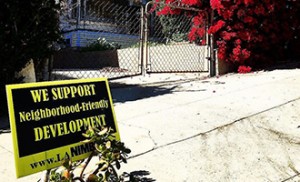Trending
In run up to NII vote, developers rush in herds to get entitlements

TRD Special Report:In the third installation of TRD’s series on the Neighborhood Integrity Initiative, we look at the surge of new projects submitted to the city as developers fear their time is running out. Stay tuned this week as we explore the implications of the NII in depth.
For Los Angeles developers terrified by the prospect of an initiative that would put a two-year moratorium on all projects that require amendments to the city’s General Plan, going through the city planning process has become a stampede-like dash to the finish.
The rush to entitle new projects before voters cast their ballots on the Neighborhood Integrity Initiative in March has resulted in a dramatic uptick in the number of new projects submitted to the L.A. Department of City Planning, according to The Real Deal’s research.
Developers filed plans for 128 new projects in the city comprising 15,736 residential or hotel units in the third quarter of 2016, up 78 percent from the 72 projects with 5,832 units they submitted in the third quarter of 2015, planning department documents show. Many of those projects would require zoning changes.
While there are likely multiple factors contributing to the hike in permit filings, sources said the escalating fear of NII was likely a “substantial influencing factor.”
“Because of the catastrophic nature of the Neighborhood Integrity Initiative, I do think folks are submitting their plans attempting to vest their applications prior to the March election,” said Brad Rosenheim, president and CEO of consulting firm of Rosenheim & Associates, who specializes in land use entitlements and planning. “You do see an uptick in that for that reason.”

(Credit: Coalition to Preserve L.A.)
If approved, NII would freeze new development that requires General Plan amendments. Projects requesting other zoning variances such as a height district change would only be approved if 100 percent of the units are affordable.
“We’re handholding all of our clients through the arduous process and we’re doing our best to navigate an ever changing landscaping,” said Adam Tischer, a commercial broker with Colliers. “I’m advising them to work expeditiously to obtain entitlements prior to this potential catastrophe.”
Tischer recently brokered a deal at 433 South Main Street in Downtown L.A., where a developer preemptively filed plans in order to get the project approved before NII could go into effect. And that developer is certainly not the only one, he said.
“Anyone who’s interested in providing housing, if they’re smart, they’re doing this,” Tischer said. “Everyone’s worried about being able to make housing available to those that need it in the city of Los Angeles. Everyone’s saying, ‘How do we still fulfill our commitments?’”
But experts said even developers who file before NII goes up for a vote have no guarantee that their projects will be grandfathered in if the initiative passes, especially since it’s designed to reach back in time and catch as many projects as it can, retroactively.
“There’s no guarantee,” Rosenheim said. “[Filing plans before the vote] is the best option given the circumstances but the attorneys would argue that there is no guarantee.”
In order to give themselves the best possible chance at following through with plans, it’s important for developers to try to “vest” their plans, meaning that they would make some concrete move to begin putting their plans in action or complete substantial work, said Con Howe, managing director of the development firm CityView’s Los Angeles fund and a former Planning Director.
“The theory is if someone has vested their rights, you can’t take it away,” Howe said.
But that can be harder than it seems.
“It’s not like you can just spend a couple thousand dollars and vest it — it’s considerable resources,” he said. “You have to spend substantial money and time to be able to vest your rights and time runs out on people. By the time you finish your construction drawings, get permits and initiate construction, the chance of getting construction started before March 16 [when the votes will be cast] is slim.”
For brokers, advising clients has become a nearly impossible task, Tischer said.
“You can’t [operate] under the impression that entitling a property is some linear path with a consistent set of rules governing the project,” he said.
In the meantime, tensions have been building. Many in the industry whose livelihoods are threatened are lashing out at the man behind the initiative, AIDS Healthcare Foundation founder Michael Weinstein, whose nonprofit organization has bankrolled the measure.
“I support all efforts against what appears to be an alleged misappropriation of funds from a foundation that’s supposed to be supporting victims of AIDS,” Tischer said. “I believe the government should investigate criminal acts with this guy.”
Editor’s Note: Tune in tomorrow for TRD’s profile on Weinstein.




